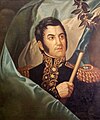Tomás Godoy Cruz

Tomás Godoy Cruz (May 6, 1791 – May 15, 1852) was an Argentine statesman and businessman. He was a representative to the Congress of Tucumán which on July 9, 1816 declared the Independence of Argentina.
Godoy Cruz was born in Mendoza, then part of the Captaincy General of Chile. He studied in Mendoza, then in Santiago at the Royal University of San Felipe, graduating in philosophy, canonical and civil law. He lived in Santiago until 1814, and served in the Santiago Cabildo (council) during the last year of his stay. He then returned to Mendoza, setting up a gunpowder factory. He agitated to make General José de San Martín governor of Cuyo, and helped finance the Army of the Andes.
In 1815, at just 24 years old, Godoy Cruz was elected by Mendoza to the Tucumán Congress and served in 1816 for the declaration. He was president on two occasions and vice-president on one. He subsequently served as governor of Mendoza Province 1820–22. In 1831 he was exiled to Chile where he was a teacher and pioneered silkworm cultivation. He was also a successful merchant of woven goods.
The city of Godoy Cruz and its surrounding department in Mendoza, and streets across the country were named in his honour.
References[edit]
- (in Spanish) Profile by the Mendoza Province education portal
- 1791 births
- 1852 deaths
- People from Mendoza, Argentina
- Argentine people of Spanish descent
- University of Chile alumni
- Members of the Congress of Tucumán
- Governors of Mendoza Province
- People of the Argentine War of Independence
- Argentine businesspeople
- South American business biography stubs
- Argentine people stubs
- Argentine politician stubs






